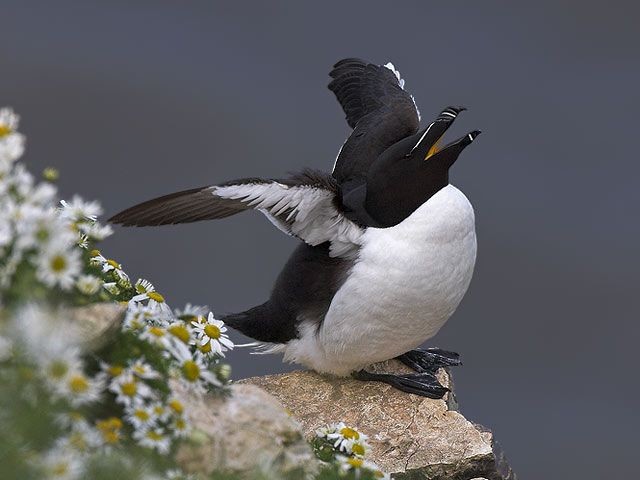Hundreds of Yorkshire seabirds drowning in fishing nets
The RSPB believes hundreds of seabirds have died so far this summer after becoming entangled in fishing nets set for Salmon and Sea Trout in Filey Bay, North Yorkshire. Because of the high numbers of bird casualties reported by the RSPB, the Environment Agency—the licensing authority—closed the fishery for two weeks in a voluntary agreement with the fishermen.

Razorbill, Bempton Cliffs RSPB, East Yorkshire (Photo: Steve Round)
However, the RSPB is extremely concerned that many more birds will die with the reopening of the fishery on Thursday. The timing could not be worse, with the fishery due to reopen at a particularly sensitive time when there are likely to be large numbers of the birds using Filey Bay. Critically, the Environment Agency will be powerless to close the fishery again if high levels of bycatch are again observed, as it has not asked the fishermen to agree to such a measure.
Kate Tanner is a marine policy officer with the RSPB. She said: "RSPB observers have witnessed horrific scenes of scores of seabirds floundering and drowning in nets set by the fishermen just offshore. We welcomed the temporary voluntary closure of the fishery, but we now have to work with all those involved to find a long-term solution to this terrible situation."

Guillemot, Bempton Cliffs RSPB, East Yorkshire (Photo: Matt Latham)
The RSPB has been working with the Environment Agency—which licenses the fishery—and Natural England, the government's statutory nature conservation agency, to solve this problem. The RSPB wants to support a sustainable fishery in Filey Bay, but is concerned that the future of any such fishery would be compromised if the large-scale death of seabirds cannot be prevented. So far the majority of the seabirds caught have been Razorbills, but it is possible that other locally-nesting seabirds, such as Guillemots and Puffins, may be caught up in the nets too.
The RSPB would like to see:
- Opening of the fishery delayed by a further two weeks, to reduce the likelihood of reopening the fishery at the most sensitive period
- Reopening of the fishery subject to stricter management conditions including attendance of the nets while they are in the water, removal of nets overnight, timely release of any live birds caught in the nets, sensitive handling of trapped live birds, and full reporting of all bycatch
- Vastly improved monitoring of the fishery to ensure that fishermen are compliant with conditions, and details of all bycatch are recorded
- Recourse to further closures if the levels of bycatch on reopening the fishery are again found to be unacceptably high

Razorbill, Bempton Cliffs RSPB, East Yorkshire (Photo: Alan Saunders)
It is almost certain that the seabirds being caught by this fishery have come from the colonies in the nearby Flamborough Head protected sites, including the RSPB's Bempton Cliffs nature reserve. Bempton Cliffs is a major tourist attraction on the northern side of Flamborough Head, where the sight of thousands of seabirds nesting on the cliffs is a magnificent spectacle.

